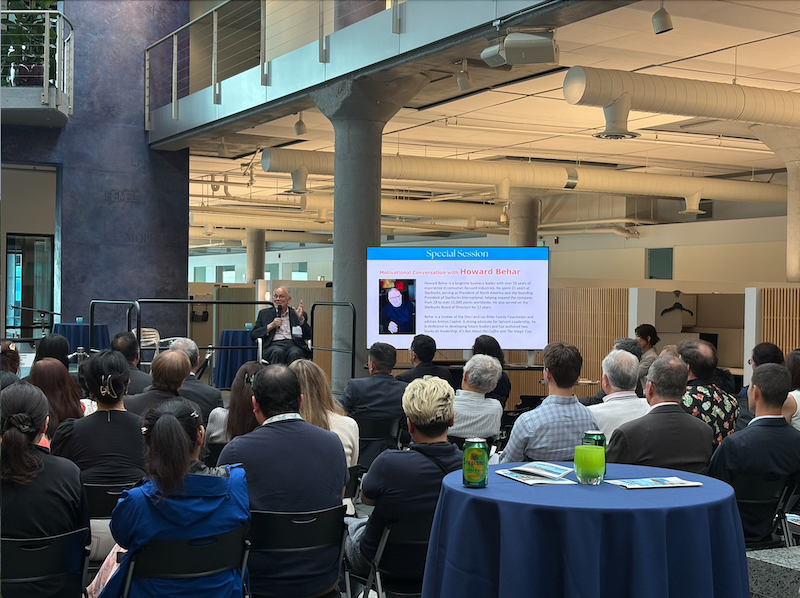
Contest Winners Announced

Thank you to everyone who submitted essays! Our judges enjoyed reading each submission and the selection process was very difficult.
We would like to congratulate Mr. Alan Williams for his winning submission, titled “Japan Can Halt the Threat of Sino-US (Cold) War”. Williams discusses the implications of the current trend towards US isolationism and shrinking military presence in Asia. He argues that Japan is in a unique position to mediate the beginning of “Pax Asiana”. His essay clearly and engagingly explores a relevant issue for both the US and Japan. You can read his essay below.
We would also like to congratulate Ms. Elissa Lee as runner-up. Her submission, “Assessing the U.S.-Japan Alliance: Can Japan Do More?”, was also very relevant and impressively thorough. She discusses the need for stronger Japanese militarism in today’s shifting status quo.
Both received their awards in a small ceremony on Tuesday, April 26th, at 12:30pm. Ms. Ami Larsen and Mr. Spenser Spencer presented Williams with 2 round-trip Seattle-Tokyo ANA tickets and Lee with an ANA gift bag. Lee also received a one-year individual membership and a 2016 Event Voucher for one.
We thank ANA, the judges, and — of course — all of the hardworking essay entrants for making the ANA Essay Contest a success!
Click on “Page 2” to continue reading.
[toggles class=”yourcustomclass”]
[toggle title=”Page 1″ class=”in”]
Japan Can Halt the Threat of Sino-US (Cold) War
Alan Williams
English & Cultural Studies Ph.D. Student
University of Washington
[/toggle]
[toggle title=”Page 2″]
Imagine if Donald Trump wins the US presidency this November and clumsily shrinks the US military presence in East Asia, as he’s suggested he might do. What would result from such a power vacuum? Would the Korean peninsula destabilize and succumb to war? Would an arms race be triggered between Japan and China for regional hegemony? Or, could reduction of the US presence be a good thing? Rather than inevitable war, one might imagine not an echo of Pax Nipponica nor a rise of Pax Sinica or Pax Indica, but an unprecedented regional collaboration, Pax Asiana, that attempts to realize the peaceful principles outlined at the non-aligned Bandung Conference held in 1955 Indonesia. International policy visions can reach beyond hawkish rhetoric one hears among today’s US, Japanese and Chinese elite. As Bonji Ohara astutely suggested in his words on JASSW’s recent panel on Japan and Asian security, Japan is in a unique position to play the role necessary to halt a potential war by engaging with Southeast Asia in a way that undercuts both US and Chinese wrangling over regional hegemony.
First, one should note that even if Donald Trump fails to secure the presidency, US sentiment toward US military presence in Asia is changing. The fear of terror, the size of national and personal debt, crumbling infrastructure, and rising economic inequality have borne a isolationism not seen in the US political landscape since the anti-internationalism of the 1920s and 30s. Many parallels exist between the post-WWI economic downturn and today. In the 1920 election cycle, Warren Harding, a Republican, won the US presidency with the slogan “Return to Normalcy,” which marshals similar affective appeals to a restoration of US economic and cultural legitimacy as Trump’s “Make America Great Again.” 1920 was the last presidential cycle in which both the Republican and the Democratic National Conventions were contested, whereas this year’s cycle is nearly as contentious. Woodrow Wilson’s League of Nations was not liked by the American public, as the average citizen
[/toggle]
[toggle title=”Page 3″]
felt that politicians and industrialists cared more about US international standing and business ties than for the ordinary, economically-struggling American. The founding of the USSR and the first US red scare served as a flashpoint for anxiety akin to urban bombings and ISIS in the present. Policymakers were concerned with Japan, whose biggest crime, from the fellow colonizer’s point-of-view, was the attempt to close China’s “Open Door” such that only Japan could reap the riches within. Today, after failed interventionism in Iraq and Syria, an ongoing recession and a shrinking middle class, the candidacies of Trump, Ted Cruz, and Bernie Sanders all represent growing and bipartisan skepticism of many US voters toward an activist US foreign policy, although all three candidates still make different interventionist concessions to defeating ISIS and executing US power to ensure global stability. Whether one views this rise of populist anti-internationalism as naïve or insightful, and even if mainstream interventionist candidates, such as Hillary Clinton, emerge from the conventions in July, the status quo will likely change.
For Japan, this new phase of US isolationism may strain an economic recovery process ongoing since the fall of the Berlin Wall. Japan remains under the spell of Cold War ideology: US military presence internationally secures global free trade and therefore a robust Japanese economy. Japan and South Korea especially benefited from the military Keynesianism of the Korean and Vietnam Wars, notwithstanding the tolls of war and the unresolved issue of North Korea. The US, Japan, the Asian Tigers and even China enjoy trade relationships established from the 1960s to the present. President Obama’s signature economic achievement, the Transpacific Partnership, extends those relationships and forges new ones—for instance, with Vietnam—to counterbalance rising Chinese influence in the region. Yet, the TPP is not liked by the American public. A fundamental goal of the TPP, to “contain” China, is at risk because the majority of the American public sees the partnership as bad for American workers, which
[/toggle]
[toggle title=”Page 4″]
means the public sees a split between its interests and US internationalism’s. Furthermore, the Manichean logic necessary to pigeonhole post-socialist China as an “evil” requiring continued US militarism and sacrifice has not been widely distributed for public consumption. US voters are more likely to regard China as an economic threat requiring protectionist policies, and hawkish US politicians are far more comfortable referencing “terror” as applied to the Islamic State and North Korea, threats that compared with the USSR, are quite small and likely exacerbated by militarism. Jim Webb, the Vietnam-veteran and only Democratic candidate this election cycle to name China as the US’s greatest peril, was practically laughed off the stage for having a “dated” Cold War mentality. For the US public, the “yellow peril” would need to be reinvented for the twenty-first century.
Yet, both the US and Japan have been planning for the waxing of Pax Sinica. Behind Prime Minister Shinzo Abe’s moves to reinterpret the constitution so that Japan can begin to tow its “fair share” of regional security, one can see the hand of President Obama’s “Pivot to Asia.” Incidentally, the Japanese public’s aversion to military interventionism is much higher than US aversion. The Abe administration and those that follow will have to construct a pro-military nationalism out of a largely pacifist population, which will only raise regional tensions given the history of Japanese colonialism….
I mentioned an alternative to war in my introduction: the spirit of the Bandung conference, which both Japan and China are purveyors and participants. While Japan, presently bound to the US, is not in a position to negotiate between the US and China, as Bonji Ohara suggested, Japan can use its substantial economic might to woo Southeast Asia to the negotiator’s table. That is to say, Southeast Asia need not be coaxed into allying with the US and Japan to sideline China into compliance; rather, the Tiger Cubs have an
[/toggle]
[toggle title=”Page 5″]
undiscovered capacity to unravel the “clash of civilizations” discourse. After all, Japan fundamentally understands the Chinese grievance. Even if practically every member of Abe’s Liberal-Democratic Party is unabashedly pro-USA, in Abe’s moves to “normalize” Japan’s role in the world, one can see the long desire to regain autonomy. Beijing’s biggest complaint, and the reason why China continues to support North Korea, is US insistence on regional hegemony since the end of WWII in the name of “security” and “freedom.” If twentieth-century US policy toward East Asia may be summed up in one phrase, it is “make sure Japan and China do not become good friends.” Why? Because Japan and China as good friends marks the end of Pax Americana and the beginning of Pax Asiana. In some ways, Japan did the US a favor by colonizing Manchuria in 1931 and sowing seeds of mistrust between the two nations. Yet, rather than mistake mistrust for ill will, and fuel rising militarism in the region, Japan ought to explore alternatives for the sake of true regional security in Asia, especially given the rising trend toward greater US isolationism and reluctant militarism.
Ohara Bonji. “Regional Security in Asia and Japan’s Role.” The Japan-America Society of the State of Washington. Seattle, WA. 31 March 2016. Panel with James Auer, Glen Fukishima, Toshihiro Minohara and Bonji Ohara.
[/toggle]
[/toggles]






